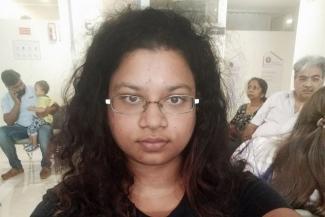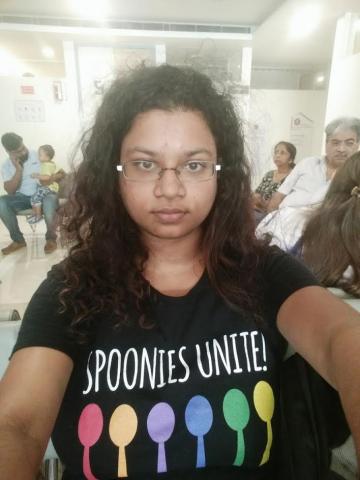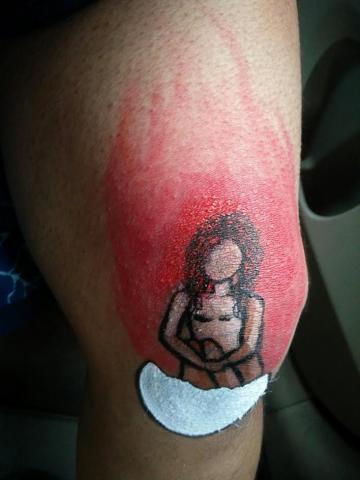
Swati Agrawal, who has Fibromyalgia, appeals to others in the community to start speaking about their invisible illness to raise awareness, remove prejudices and advocate for more equal and friendly world. If you have a story to share, write in to us.
You can't see that I am unwell. You can’t tell that I have multiple Chronic Invisible Illnesses by talking to me, or by looking at me. I will tell you the customary "I am fine" to "How are you". This is the story of all spoonies. Our illness is invisible. And we have learnt that what's not visible is supposed to be hidden. (A ‘spoonie’ is someone living with a chronic illness)
I have been living with multiple Chronic Invisible Illnesses including Fibromyalgia and Bipolar Disorder for many years now. These “illnesses” are a constant part of my life, and shade every aspect of it - from my career options to personal relationships, and from making the morning coffee to attending a wedding. It is also an aspect of my life that I hardly spoke about in social settings.
Around a month back, I found myself discussing Fibromyalgia at a social gathering with a set of people who were sympathetic and understanding. The questions and contemplations, made me realise that we really need to spread more awareness about Chronic Invisible Illnesses. We should be eventually able to advocate for more accessible spaces and recognition of invisible illnesses under disability laws. If you have flu, you get a day off. If I have brain fog (a symptom of Fibromyalgia), don’t I deserve the same? So, spoonies, speak up!!

At the hospital. I have to visit hospital at least once a week on average. Sometimes, more.
Currently, we are caught up in a Catch 22 situation where we don't speak up about our illness due to the prejudice towards chronic illness in the society. This prejudice against invisible illness exists due to lack of awareness. So, let's break the vicious cycle. I request people with Fibromyalgia and other invisible health conditions to start speaking up about them. In an attempt to spread more awareness, I shared different posts on Fibromyalgia, with some of them summarised here. Let’s start with the basic questions.
What are invisible illnesses?
Invisible illnesses have symptoms that are not clearly visible or identifiable by looking at a person, or by use of diagnostic lab tests. The diagnosis is usually based on the symptoms communicated by the patients, due which these illnesses are less visible. Some common symptoms are debilitating pain, fatigue, cognitive dysfunctions, sensory overload and digestive problems. Some common invisible illnesses are Fibromyalgia, Chronic Fatigue Syndrome and Lupus. Diabetes, mental health disorders etc. are also included by many within the definition of invisible illnesses.
Why do we need awareness?
I have actively tried to speak about chronic invisible illness, and I often receive a lot of backlash against these humble attempts. Others working towards spreading awareness about invisible illnesses have similar experiences. People insist that I don’t need to speak so much about my health conditions. It sounds like a cry for attention/sympathy or just general cribbing. Well, it is an attempt to solicit some understanding, but I don’t see anything wrong with that.

This is a body art at an event Splatter Speak by Living Stories. It represents how dealing with my health helped me come out of my shell and accept myself.
The most important reason to hear us about our lives with chronic illness is that like everyone else, we also need to be understood. We also want our experiences and struggles to be validated. We must fight prejudices about invisible illnesses. People often comment that such conditions are “just in our head”, and imply that, thereby, they are lesser than “real illnesses”. Just because there is no blood test or visible symptom to make an illness visible, it doesn't make it is any less real. We want our experiences to be accepted as real, and to be able to share them without facing hostility. This validation is important as it ensures that people have a good support system among family and friends, and don't need to hide their illnesses due to stigma. Lack of acceptance ingrains a lot of guilt in patients as they internalise the perception that their illness is not so real, and they are creating a lot of fuss for no reason, and causing inconvenience for others.
Secondly, more awareness about an illness has important benefits that some may consider as more tangible. More awareness means more demand for cure, which leads to more expenditure on R&D by pharmas. It could also lead to the start of a movement that could one day advocate for the rights of people with invisible disabilities. It could also help in building support systems for spoonies.
You Are Not Alone: Join the Fibromyalgia Support Community
What's it like to live in a world that is hostile or at best, oblivious to invisible illness?
Without awareness, we live in a hostile world. Our illnesses are an important aspect of our lives that the world doesn’t accept or understand. It makes us feel like we are living on the fringes. We are the “outsiders”, the “others”. A lot of people with invisible illnesses lose their relationships, or can't find a partner due to their health condition. Often, people forget that people with invisible disabilities are still sexual beings, or have same desires as those without the invisible disabilities. More often, they are seen more of a burden. After all, stigma, prejudice and fear of unknown drives us all.
Another important problem due to lack of awareness is lack of accessibility for people with invisible chronic illnesses. For example, we can't travel easily unless we have lots of money. Our public transport system, hotels, tourist spots are all rather inaccessible. Next time, check the number of stairs or the uncomfortable seat or the high shelf, and ask yourself - would I be doing this with my body burning with pain?
Most spoonies are unemployed or underemployed. With most industries obsessed with making humans work around the clock, we are considered to be bad investments. This is a wrong perspective. It is possible to build a more accessible workplace and it would help everyone, not just people with invisible disabilities. How about some good speech to text software, or ergonomic chairs and tables? It would make the workspace overall productive and inclusive.
So, the cards are stacked against us, because this world hasn't been built for people like us – people with everyday pain and fatigue. Sometimes, I feel defeated. For example, when I have to take the metro for work related travel or to see a doctor. Often, my legs are paining and it is a herculean task, but I can't always afford a cab. Sitting in the chairs of many restaurants hurts. When all these small things accumulate, I feel the need for my voice to be heard.

Small victories - a picture of the breakfast I made on a day with Pain Level 8.
I know many of us who have given up. Suicide rate among people with chronic illnesses are estimated to be ten times higher than among the general population. It is said that Fibromyalgia is debilitating and it disrupts the quality of life. Well, this world doesn't help!






